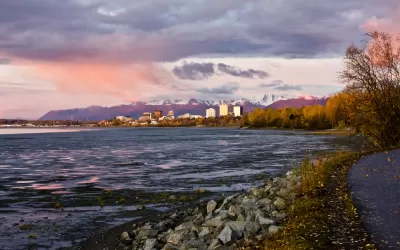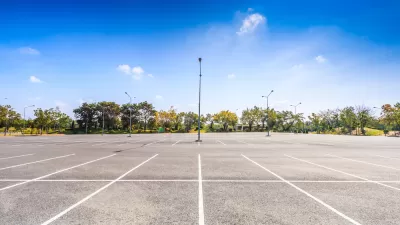With an average of eight parking spots per one car, U.S. cities have a glut of parking. How can valuable urban space be used more effectively?

In an opinion piece for the Anchorage Daily News, Kevin Cross, Amanda Moser, Eric Visser, Daniel Volland and Emily Weiser argue that, like many other U.S. cities, Anchorage has a parking problem. That is, there is too much of it.
According to the authors, “Excessive parking obstructs housing development, impedes adaptive reuse of buildings and hinders the creation of vibrant spaces that allow our community to flourish and feel connected.” They attribute this in part to the parking minimums included in the city’s municipal code, which call for unnecessarily high numbers of parking spots for many uses.
Parking overbuilt to a level far exceeding normal usage creates vast swaths of empty space. Less land is available for development that adds value to our city. It is, therefore, worth exploring whether we should require minimums at all.
The article argues that eliminating parking minimums won’t affect existing parking, will still allow developers to include as much parking as is appropriate for their projects, and will have only small, incremental effects on on-street parking. Pointing to an example from Portland, Oregon, the authors write that “Parking minimums raise the cost of housing when Anchorage has a critical need for affordable and middle market-rate housing. They make multi-family housing developments more expensive and often impossible to build.”
To cement their case against minimum parking requirements, the authors note that the requirements put a disproportionate burden on small entrepreneurs who want to rehabilitate old buildings, decrease walkability, and slow housing construction. “In the absence of parking minimums, we’ll still have parking— but we’ll be free to decide how much it’s worth to us and weigh its value against the other things we could do with the same finite, precious land.”
FULL STORY: Anchorage has a parking problem — but maybe not the one you think

Alabama: Trump Terminates Settlements for Black Communities Harmed By Raw Sewage
Trump deemed the landmark civil rights agreement “illegal DEI and environmental justice policy.”

Planetizen Federal Action Tracker
A weekly monitor of how Trump’s orders and actions are impacting planners and planning in America.

The 120 Year Old Tiny Home Villages That Sheltered San Francisco’s Earthquake Refugees
More than a century ago, San Francisco mobilized to house thousands of residents displaced by the 1906 earthquake. Could their strategy offer a model for the present?

In Both Crashes and Crime, Public Transportation is Far Safer than Driving
Contrary to popular assumptions, public transportation has far lower crash and crime rates than automobile travel. For safer communities, improve and encourage transit travel.

Report: Zoning Reforms Should Complement Nashville’s Ambitious Transit Plan
Without reform, restrictive zoning codes will limit the impact of the city’s planned transit expansion and could exclude some of the residents who depend on transit the most.

Judge Orders Release of Frozen IRA, IIJA Funding
The decision is a victory for environmental groups who charged that freezing funds for critical infrastructure and disaster response programs caused “real and irreparable harm” to communities.
Urban Design for Planners 1: Software Tools
This six-course series explores essential urban design concepts using open source software and equips planners with the tools they need to participate fully in the urban design process.
Planning for Universal Design
Learn the tools for implementing Universal Design in planning regulations.
Clanton & Associates, Inc.
Jessamine County Fiscal Court
Institute for Housing and Urban Development Studies (IHS)
City of Grandview
Harvard GSD Executive Education
Toledo-Lucas County Plan Commissions
Salt Lake City
NYU Wagner Graduate School of Public Service





























